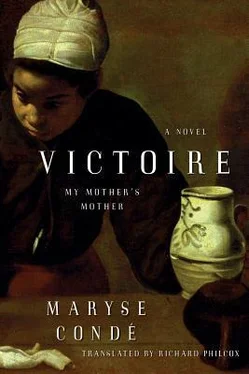Such unchristian behavior offended Rochelle Dulieu-Beaufort. How could a priest condemn an innocent child to eternal damnation? She turned once again to her friend the priest at Saint-Louis and begged him to ignore this shameful directive. Jeanne, dressed in a gauze robe and wearing a bonnet worn by the last of the Dulieu-Beauforts’ ten children, was baptized in the chapel at Maule. Anne-Marie and her younger brother Etienne acted as godmother and godfather.
There were no guests, not even Lourdes. No chodo custard, no cake. A drop of aniseed-flavored lemonade. With a pound of flour from France, Victoire made fritters and waffles. After the ceremony was over Anne-Marie, for once all smiles, improvised on her viola Souvenir des Antilles, a selection of Creole melodies composed by M. Gottschalk, the well-known pianist who, the previous year, had won fame during his tour of Martinique and Guadeloupe.
Such an act of cruelty aimed at her child was probably the last straw. It prompted Victoire to make a major decision: leave La Treille and Marie-Galante.
It is likely that Anne-Marie also gave her the idea, since she had moved to La Pointe following her marriage. Without her, under Rochelle Dulieu-Beaufort’s iron rule, Maule and Marie-Galante were nothing better than a prison.
Informed of the plan, Lourdes clapped her hands and offered to accompany Victoire. Oh yes! Leave! What had they to lose? A ramshackle cabin. Marie-Galante was going from bad to worse. We could even say she was dying. There was less and less work. The sugar factories were in decline. Let’s take Elie as an example. Exile had made him into a success story. Turning his back on the whims of fishing, he had found a job in a factory at Goyave specializing in the processing of ramie. There was only one point on which aunt and niece were in disagreement: Lourdes insisted on doing the rounds at La Treille to present her farewells. To go off in secret, without saying a word, would be nothing other than self-mutilation. Some of the inhabitants remembered her mother, Caldonia, and had witnessed her birth, tenth in line. Some had attended her christening. Others her first communion. Consequently, she would appropriate their memories in order to alleviate her uprooting. Victoire fiercely refused to hear of such a proposition. Never, never would she step into the homes of people who had humiliated her and hated her ever since she was a little girl. She could never forget their sarcastic remarks and the names of Ti-Sapoti and Volan they gave her. When she was lying sick at death’s door, how many of them had troubled to pay her a visit, say a prayer or a Hail Mary?
The only person she visited to explain why she was leaving was Rochelle Dulieu-Beaufort. It was then that Rochelle’s mean and cantankerous character got the upper hand and she heaped insults on her.
“What! Who will cook for me now?”
So that was how Victoire rewarded her for all the kindness she had shown her and her bastard child? She was truly a wretch, a dreg from hell who was hated by everyone on Marie-Galante.
I CAN SEE them on that morning of June 1890 as they leave their native land.
Victoire has wrapped Jeanne in a white baby’s cape and is hugging her close. The infant, who is hot under all this wool, is constantly fidgeting. She manages to wriggle free and pokes out her head, observing her surroundings with curiosity.
People on the jetty are guessing the weight of the wicker basket that Lourdes is carrying. Are they leaving for good, these shameless hussies, these dames-gabrielle ? Let them take their loose living elsewhere so that young girls from good families can marry at church with veil and crown!
With not enough money for the steamship that leaves Grand Bourg every Wednesday for La Pointe, the trio settles down at the front of the schooner Arc-en-Ciel . The stern is reserved for merchandise, animals, piglets, chickens, and goats. Rocked by the breeze and the movement of the waves, Jeanne soon falls asleep. Lourdes bites into a danikite doughnut.
What was Victoire thinking during the never-ending crossing? Did she realize she was seeing Marie-Galante for the very last time? The odds are that she was oblivious to the splendid panorama: the islands of Les Saintes playing dice on the velvet of the ocean, the colored ridges of the Soufrière volcano, and the gauzelike scarves of clouds. Her only thoughts were for Caldonia and the days spent with her. Did she regret turning her back on this flat island where lay the graves of her mother and grandmother?
As a precaution against seasickness she had brought along some lemons. Her tense fist became sticky from squeezing the slices as she unconsciously forgot to put them in her mouth.
Since the wind was brisk, they arrived early midafternoon at the entrance to the harbor at La Pointe through a difficult narrow passage where the isles of Cochon, Pitre, and Montroux drift
toward the headland at Jarry. At that time, one side of the Place de la Victoire, devoid of wharfs, came to rest on a quiet beach while the other three sides were lined by the trees of liberty, the sandbox trees planted by M. Victor Hughes. In the neighboring streets, cases and bundles of merchandise were piled up in front of the stores amid heaps of packing straw and canvas. True to their habits, a crowd of loudmouthed and ragged dockers stared at the young girls. Lourdes was offended by the catcalls and lewd invitations, whereas Victoire kept walking, head lowered, hugging her child to her heart.
Once again they didn’t have enough money to pay for the coach that traveled from La Pointe to Goyave in two hours and forty-five minutes. They had to make do with one of the sailboats that linked up with Petit Bourg by way of the Petit Cul-de-Sac. Since they were to set sail at dawn, they had to sleep at the house of a certain Sigismonde Quidal on the road to Les Abymes, who asked next to nothing for the room and pig-foot soup.
They left at four in the morning, the baby muffled up to her eyes, the adults shivering in the cool of the predawn. They had been kept awake by the chimes of the church of Saint-Pierre and Saint-Paul. They had just dropped off when the din of the night soil carts and the smell of their contents abundantly spread over the sidewalks once again interrupted their sleep. At La Pointe, the town’s sanitation services resembled Rio de Janeiro’s, a city that didn’t have cesspools either. Excrement was poured into barrels, the contents of which were then thrown into the sea.
On the other side of the bay, nestled up against the mountains, the busy streets of Petit Bourg hinted at the crowded town it is today. Lourdes and Victoire did not linger and set off for Goyave, carrying the baby in turns as they walked the six or seven kilometers. Victoire was frightened by the roar of the rivers and gullies that wound under the rope bridges, as well as by the stifling thickness of the vigorous vegetation ready to swallow her up: all types of trees whose armpits were eaten away by wild pineapples, creepers, orchids, tree ferns, and shrubs. This landscape was so different from the flat cane fields of Marie-Galante, dotted here and there by windmills. At times they were forced into the ditch to avoid the oxcarts, trundling along amid the cracking of whips, the swearing of the drivers, and the creaking of the axles.
The town of Goyave was nothing more than a hamlet. A few cabins scattered along the seashore. But it took them hours to find Elie’s. Fortunately, at the church that had been totally destroyed by the 1843 earthquake and rebuilt in stone, the asthmatic priest was kind enough to give them directions. They had to walk along the railroad tracks, used for transporting the cane to the Marquisat factory in Capesterre, until they reached the entrance to the beach at Sainte-Claire. Dusk was falling when they finally knocked on the right door.
Читать дальше












